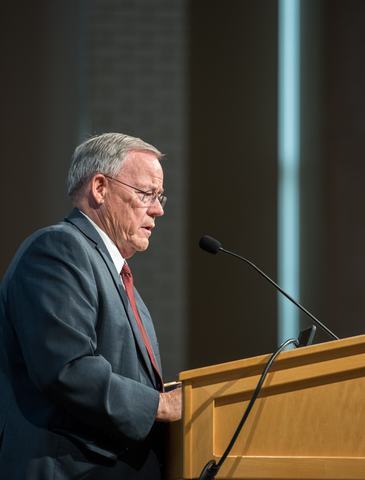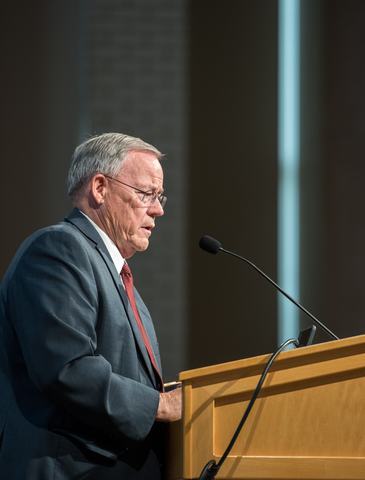More than a year ago, author Gerald N. Lund was preparing to speak at a fireside when organizers requested he set aside time to address a question that kept coming up in interviews and discussions.
"Why am I not getting an answer to my prayers?" Lund said.
"The more I thought about it the more I thought that is a question that all of us who are striving to be faithful will ask ourselves sometime or another. Joseph Smith — 'Oh God, where art thou?' (Doctrine and Covenants 121:1); Christ on the cross — 'Why hast thou forsaken me?' (Matthew 27:46). So I decided to make that the topic for the whole fireside. It was so well received. . . .This really is a topic on people's minds."
Lund's effort to answer that question has resulted in a new book, Why Isn't God Answering Me?
This book is No. 35 on a list of published titles for the prolific, best-selling author, who previously taught for 35 years in the Church Education System before serving as a General Authority Seventy for The Church of Jesus Christ of Latter-day Saints from 2002-2008.
The soon-to-be 79-year-old recently discussed his passion for writing and his personal insights related to unanswered prayers.

Keynote speaker Gerald Lund talks of Christ for the opening session of Education Week. Michael Lewis/BYU-Idaho
This interview has been edited for length and clarity.
Deseret News: You are approaching age 79 next month and you have now published 35 books. What motivates you to keep writing when others your age may be slowing down?
Gerald Lund: Well, primarily, two things — I love to teach, which I still do, and I love to write. Writing is just another sneaky way to teach. And I love staying busy. I think you know my wife passed away about four years ago. I have family close by and out-of-state, so I do a lot with family. But I like to write and I like to teach.
DN: What makes this subject of unanswered prayers so relevant for people now?
GL: This really is a topic on people's mind and one of those issues that has come up over and over where they are saying why can't I get answers? I've talked about it several times since (that first fireside) and it's the same reaction all the time. This is something I've really wondered about.
It will be interesting to see how this book does because it's a title that's resonating with people. Every person of faith has faced that question and typically many more times that one.
DN: Several books have been written on the topic of prayer. What sets yours apart?
GL: As I prepared for that fireside, and then later the book, a couple of things came to mind that I hadn't really thought about before. One is this is a question that only believers ask. You don't hear atheists or agnostics saying "Why isn't God answering me?" The ones who are asking it are good people striving to be faithful, who in whatever circumstances hit them, wayward children, cancer, whatever it is, and what's driving this is "I've been faithful so why isn't this working?"
With that in mind, then came this idea. That's not a simple question because there are literally hundreds of possible answers and that varies from individual to individual. Sometimes there are little things you are doing, little in the sense of what the world would consider wickedness, but the Spirit is a pretty sensitive instrument. Like in Elder Larry R. Lawrence's general conference talk, "What Lack I Yet?" Some of the answers he got — clean your room and stop being negative. That was a wonderful thought because it was a reminder that sometimes there's things we don't even think about that we're doing that if the Lord said, "If you're asking me why I'm not answering you, here's a possibility."
So my approach didn't become a more generic, it's a time of trial, we have to be faithful, we have to press on and so on. It was more of, well, I use the analogy of the pantry. You go into this question and you got all these different kinds of possibilities. So let's just put them on the pantry shelf and you walk in and say, "Oh yeah, that one's mine."
DN: Is there a personal experience in your life with an unanswered prayer that stands out? How did you cope with it? How did it strengthen your faith?
GL: Oh, there's been a lot because you think you know what you want. You even think it's a righteous thing.
One of the chapters of the book is "Our Wants are Too High." As a young man, I was dating a girl pretty seriously, I had a job working construction and I was making good money. I always wanted to go on a mission, never questioned it, but all of the sudden, it's not very attractive. But this is back in stake missionary time, so I thought, "Ah, I can be a stake missionary, have my cake and eat it too." The more I thought about it the more I think this is perfect.
My dad was faithful but had a rough childhood and some real hypocrisy in his family about the church. He was sometimes critical of church members and leaders, so I figured I'd go in and tell my dad and he'd say I don't blame you. But to my surprise, he said, "No, we really want you to go on a mission." Out of the blue, and this was so unlike him, he said, "You are old enough to make your own decisions but will you take two different days and go up and fast and pray. If you come back and say I've got my answer, we'll not say another word." I thought wow, that's going to be easy because I know what my answer is. I know it's pleasing to the Lord.
So I went up one of the canyons and spent all day on a Sunday reading the scriptures and finding every scripture about serving in Zion, which to me meant Utah. I went back and told my dad I still had the same feeling. He said, "OK, but you promised me twice."
I went up again and did the same thing. I came back down and went to church with my girl. I wasn't even thinking about this anymore. I was sitting there and it was a boring meeting. Finally, I picked up the hymn book and opened up "I'll Go Where You Want Me to Go." As I looked at the title, I thought, don't read that. I can remember that very clearly. By the time I finished the third verse, I looked over to my girlfriend and tears were streaming down her face. She said, "You're going, aren't you?" I said, "Yes."
I look back now and writing, seminary teaching, probably none of that would have happened (if I hadn't served a mission in Montana). Sometimes you just got to get out of the way and let the Lord take you where he wants to take you.
DN: In the first chapter you write that prayer is an astonishing privilege when you think about it. God is the Supreme Being in the universe and although we are weak, sinful creatures, he doesn’t ever go on vacation or have office hours. He allows us this opportunity of communion. Why don’t you think more people appreciate or value the opportunity to pray to God?
GL: That's a really good question. I think part of it is that we have some misconceptions about the nature of God. One came from a Christian minister originally, and he calls it the divine vending machine syndrome.
One of the things I tried to point out is the idea that sometimes the answer to why isn't God answering me is because you're doing things that are inhibiting revelation. We all do that.
Another answer is it may be because of your faith. Maybe he does love you and that means I'm doing some tutoring and the divine tutorial. That's a really important one for me.
Sometimes God isn't saying no, he's just saying not yet, because why would I take this growth experience away from you?
Sometimes I have people who ask me that question knowing that I've been working on this project, and they'll say "So if I asked you why isn't God answering me, what would you tell me?" I don't know, but I know who does, and that's how it is.
Elder Lawrence said this and then Elder Kim B. Clark (a General Authority Seventy) said — we ought to always to be asking two questions in our prayers: What am I doing that could be inhibiting revelation? What should I be doing that would enhance revelation?
DN: You pointed out that the Savior Jesus Christ and Joseph Smith both know the feeling of an unanswered prayer. There is also a quote in the book from President Russell M. Nelson sharing the same sentiment. What difference could it make for people to realize that even the Savior, Joseph and President Nelson know the feeling of an unanswered prayer?
GL: That was an important insight for me. In Numbers 11 there is one I just love. Moses is so frustrated with the children of Israel griping, moaning and complaining that he, in my words, basically says Lord, I don't know why you put this on my shoulders. If you really love me, take me out now. That's pretty discouraged.
So it's like, wow. Why should I be feeling sorry for myself when even the Savior faced that. So that was an important insight for me.
DN: Previously you've spoken about receiving an answer to prayer to do "The Work and the Glory" series and the next day you were called as a bishop. What have you learned about answers to prayers that seem confusing?
GL: After I walked out of the stake president's office, I went like this (looked heavenward with a concerned expression and hands raised), "Really?" But what I found about a year and a half into being a bishop, I thought you are writing more efficiently than you did when you were not a bishop. And so I thought back to that and think, "OK, I'm sorry. I'm sorry for even questioning it."
Sometimes if we just say, "I'm going to step into the darkness." I have often said to my kids I have a love-hate relationship with the hymn, "Lead Kindly Light," particularly the first verse: "I do not ask to see the distant scene — one step enough for me." I don't want to see the end, I mean that would be nice, but give me three steps at least. But that's not the way it works."
DN: What difference would it make in the church and beyond if more people understood and practiced the basic principles of prayer?
GL: It wouldn't solve all of our problems of course but I think it would simplify our lives in so many ways, particularly when we're younger. We do dumb things all the time that complicate our lives. But the Lord's promises are pretty impressive. It doesn't mean all the answers will be given to us, but you get so you see it over and over and over, and in most cases, for me, they're just tiny miracles, things that happen that you think that would be so easy to explain away, but you know it's not.
It's interesting that in April, President Nelson gave a whole talk about revelation ("Revelation for the Church, Revelation for Our Lives") and one of the things he says is that "In the coming days, it will not be possible to survive spiritually without the guiding, directing, comforting, and constant influence of the Holy Ghost."
He's feeling something. That's why I think this is such a critical question for all of us.
Lead image of Brother Farias, an instructor, praying with Elder Abraham Gutierrez and Elder Erick Puche while they role-play a home visit at the Missionary Training Center in São Paulo, Brazil on Thursday, May 24, 2018. Spenser Heaps/Deseret News
It's a question we've all faced at one time or another. Why isn't God answering my prayers? We may seem to be doing everything right—going to church, fulfilling our callings, striving to strengthen our families, and, of course, praying. But still the answer doesn't come. If there are no serious sins blocking out the whisperings of the Spirit, why then do the windows of heaven still seem to be closed?
In his wise, conversational style, best-selling author Gerald N. Lund offers suggestions and solutions for all who are anxiously hoping to hear the voice of the Lord in their lives. He helps us to approach this timeless question with new perspective and insight that will help us realize the ways the Lord is answering our questions or the reasons He might not be—yet. Available at Deseret Book stores and on deseretbook.com.







